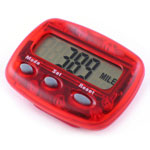Quantified Self: Your Way To Good Health?
What is your take on the "quantified self" movement, which uses technology to monitor personal biology? Do you think it’s healthy practice, or is it just another way to become obsessively worried about health?
Andrew Weil, M.D. | January 29, 2013

The practice of using technology to track what you eat and drink, how much you exercise, how your moods vary, how well you sleep and whatever other data you want to collect and analyze about yourself in order to improve your life is variously described as "self-tracking" or "self-quantifying." Whatever you call it, this appears to be a high-tech twist on the kind of record-keeping that has long been used to help people lose weight or help figure out what triggers allergy symptoms or migraine headaches. The difference is that we now have a seemingly infinite array of gadgets to assist with the record keeping and analysis.
As I understand it, the high-tech "self-quantifying" movement traces its origins to a blog cofounded by Gary Wolf, a San Francisco journalist, and has taken root across the United States, in Europe and elsewhere in the world. In an article in the New York Times Magazine in 2010, Wolf described self-quantifying this way: "Millions of us track ourselves all the time. We step on a scale and record our weight. We balance a checkbook. We count calories. But when the familiar pen-and-paper methods of self-analysis are enhanced by sensors that monitor our behavior automatically, the process of self-tracking becomes both more alluring and more meaningful. Automated sensors do more than give us facts; they also remind us that our ordinary behavior contains obscure quantitative signals that can be used to inform our behavior, once we learn to read them."
I can see that some of the information collected by self-quantifiers could pay off by yielding data that reveals what is aggravating asthma or allergy, what affects how well you sleep or the effects of drinking alcohol on your co-ordination, reaction times, memory and emotions. As I read up on the self-quantifying movement, I came across the finding that pooled information collected and shared by migraine patients revealed that those affected by vertigo during the headaches were four times more likely to have painful side effects to a drug used to relieve migraines. Mining all the health data that’s now being collected and shared could yield useful results if it enables patients and their doctors to fine-tune treatments.
Medicine already does its share of tracking – doctors attach monitors to patients to record their heart rhythms and require them to keep a detailed diary of everything they do and how they feel while wearing the device. We measure, track and record blood pressure, cholesterol levels and other numbers that reflect health or risks of disease.
There are some obviously useful personal tracking practices such as counting calories if you’re trying to lose weight, quantifying the amount of caffeine you ingest and its effects, or wearing a pedometer to motivate yourself to exercise. Aside from these, my personal feeling is that a constant focus on personal tracking and analysis could drive you crazy. The fact that technology has made it possible to do this, doesn’t necessarily mean that you should.
On the other hand, if you are, as Gary Wolf put it in his Times article, an "ultrageek," and you find such measures make you both healthier and happier, then self-quantifying may indeed be right for you.
Andrew Weil, M.D.










